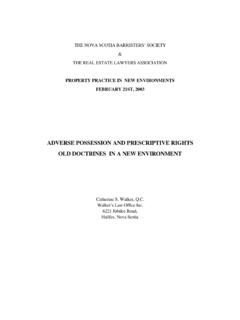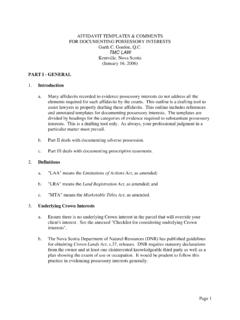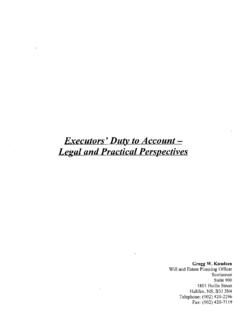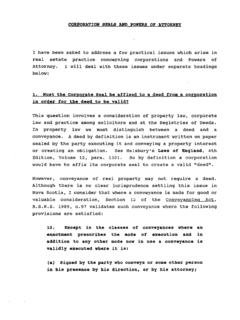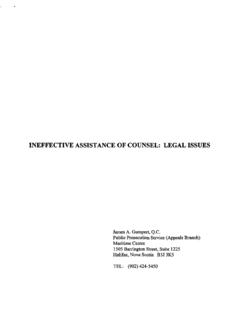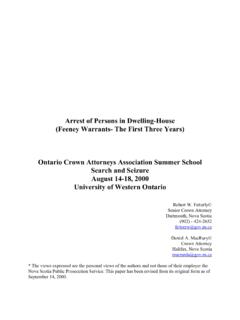Transcription of The Continuing Legal Education Society of Nova Scotia
1 The Continuing Legal Education Society of nova Scotia SECTION 1. The Old & The New: A Look at Probate in nova Scotia Anna Paton, Proj ect Manager Probate Reform Project Department of Justice ( ).. - - - - - - - - Suite 1110 - 1660 Hollis Street, Halifax, nova Scotia , CANADA B3J 1V7 - - - - - - - - Tel. 902 422 1716 or 800 577 1351 Fax. 902 429 7892. THE OLD AND THE NEW. A LOOK AT PROBATE IN nova Scotia . When Bill 74, the Probate Act, was introduced on November 3, 2000, Justice Minister Michael Baker, quoting from Benjamin Franklin noted that" .. in this world nothing can be said to be certain, except death and taxes," and that this bill deals with both. The new Probate Act also contains significant changes that are meant to modernize and simplify the practice of probate law in the Province. One of our colleagues has dubbed the changes "evolutionary" rather than "revolutionary'". and with the exception of significant change to the laws concerning the devolution of land, "procedural in nature, but none the less important in terms of cost and convenience".
2 2. The Probate Act was proclaimed into law on October 1, 2001, bringing with it some historic reforms to the probate system in nova Scotia . As a consolidated version of the Act is not yet available, it can be found in Bill 74 of the Acts of2000 and Bill 25 of the Acts of2001. The latter, called the Justice Administration Amendment (2001) Act, contains in Part VIII a number of amendments to Bill 74, most of which deal with the most significant of the reforms - changes to the laws relating to the devolution of land. For the first time, the Act contains Regulations and "fill in the blank" forms. The forms are included with your conference materials for easy reference. Attached to this paper you will find a copy of the 'starter kit' for opening probate and administration at the Court of Probate, which provides, among other things information about availability of the Act and Regulations from government offices.
3 OLD VERSUS NEW - WHEN THEY APPLY. This paper isn't directed towards the 'old' probate statute - but aims to highlight some of the new features of probate in nova Scotia . Suffice it to say that the 'old' Probate Ad will apply to estates ' Matthews, "Law Refonn in nova Scotia - A New Probate Act" (2001), 20 & 298. 3. 1989, 1. opened at the Probate Court before October 1, 2001, - the administration of land which is part of an estate for which the will predates October 1,2001, and the administration ofland owned by a person who died without a will (intestate) before October 1,2001. Subject to the above, all estates that are 'opened' at Probate Court from October 1,2001 will follow the provisions of the 'new' Probate Act. When the will is dated on and after October 1, 2001, and when the intestate dies on or after that date, the land of the deceased will devolve under the new legislation. There have been questions about the possibility of 'opting' in to the new Act in situations where the 'old' Act would otherwise apply, and that will not be permitted by the Registrars of the Probate Court.
4 There are a few changes in terminology in the new Probate Act, (which I will refer to in the remainder of this paper as the 'Probate Act' or 'new Act'). The phrase "personal representative" is used to include both executor/administrator, unless either of those terms is specifically required. The Court will now issue a "grant" of probate or administration or administration with will annexed, rather than the previous letters testamentary etc. A comparative list ofthe 'old' and the 'new' terms can be found in the 'starter kit' appended to this paper. CONVEYANCING. As previously noted, perhaps the most significant ofthe reforms is to the law by which real property devolves. nova Scotia has been unique in Atlantic Canada, and indeed in Canada, in vesting the "heirs-at-Iaw" ofa deceased intestate person with title to their land. We have also been unique in allowing the testator to bypass the executor in devising land directly to a beneficiary.
5 These laws have changed. A most useful summary of these changes, their significance and practice tips has been prepared for 2. conference participants by Erin O'Brien Edmonds, and there is no need for me to elaborate further. Some of the other significant changes to the Probate Act are set out in the following pages. PROOF OF A WILL..Previously, the affidavit of a witness to a will, (proving that they watched it being signed) was made after death at the Court of Probate. Quite often, years pass between the signing of a will and the death of a testator. Sometimes witnesses to the will were dead or could not be located. This has caused delay and added to the expense in processing an estate. Under the new Act, an affidavit of execution of a will may be made at any time after the will is signed including at the time of the application for a grant from the Court, and the affidavit may be deposed to by a barrister of the Supreme Court, notary public, registrar or deputy registrar of probate or any other person that the registrar directs.
6 This allows for the affidavit of execution to be signed by a witness as soon as they have observed the testator signing his or her will. Commissioners of Oaths are not permitted to take the oath of a witness to a will. If the affidavit is not taken before death, it may be taken at the Probate Court or elsewhere by the above mentioned persons. If none of the above persons are available the Registrar will provide 4. directions for the execution of this affidavit. Regulation 11, "Proof of execution of will", contains provisions that consolidate many existing Probate Court practices for proving the execution of a will added a few others. ASSET PROTECTION PRIOR TO A GRANT. A person may apply to the Probate Court for an order restraining any other person from dealing with property of a deceased under section 17 of the new Act. This wasn't available under the old Act. The court has the power to award costs as it sees fit in these applications.
7 4 Regulation 11(9). 3..,. The office of the Public Trustee has an expanded role in the protection of estate assets. The Public Trustee may take possession of any of the deceased's property - real and personal- which hasn't been possessed by an executor or by persons entitled under intestacy laws to share in the distribution of the estate. 5 The purpose for such possession by the Public Trustee is to protect and preserve the property. In addition, the Public Trustee becomes vested with the personal property of an intestate until the appointment of an administrator by the probate court. 6. The Public Trustee need not make application to court in order to take possession of the property, and while the Public Trustee has possession of it they have all the powers an executor or administrator would have over that property and is entitled to be paid compensation and expenses for their actions. 7. ENTITLEMENT TO ADMINISTER.
8 Section 32 of the Act gives the spouse and children of the deceased equally the first right to administer an estate, followed by persons living in nova Scotia who are entitled to share in the distribution of an intestacy or because they are adult residual beneficiaries. Next in line is the Public Trustee followed by non-resident adult residual beneficiaries or heirs of the intestate, followed last by creditors or persons with a cause of action against the estate. NON-RESIDENT ADMINISTRATORS. In the past non-resident heirs of a person who died without a will were not entitled to be the administrators of the intestate's estate. In many cases, the Pub1ic Trustee took on the role ifheirs in nova Scotia were unable or unwilling to take on the role of administrator. Under the new Act, non-residents are entitled to be appointed as administrators, subject to receiving consent of the 5 Section 18. 6 Section 45.
9 7 Section 18. 4. Public Trustee. 8 In most cases these administrators must be bonded. NOMINEE ADMINISTRATOR. Because our new Act permits the heirs of a person who dies without a will to nominate a trust company as administrator of the estate instead of taking on the role themselves, the cost of posting security may be avoided. Sections 32(4) and (5) also permit the heirs to nominate a person other than a trust company to be their administrator. In these cases the other person must provide security to the Court. In order to be appointed written consent from the Public Trustee and heirs must be made (in Form 15 or 16) and filed at the Probate Court. Registrars are prohibited from issuing a grant to a 'nominee' until the forms have been filed with the court or a court order dispensing with the forms is on file: BONDS AND SECURITY. Section 40 of the Probate Act requires non-resident executors to post security for their role as personal representative unless anyone of the following circumstances apply: a) the executor is the sole beneficiary of the estate, or is a trust company or Public Trustee.
10 B) all beneficiaries under the will are adult and consent to dispense with the security;. c) there is a co-executor residing in nova Scotia ; . d) the date of the will predates the proclamation of the Act;. e) the will says otherwise. 8 Section 32(1)( d). 9 Regulation 35(2). 5. Because Sections 40(2) and 40(3) of the Act allow the court to dispense with posting security in certain situations, Regulation 42(11) requires the personal representative to file an affidavit that establishes the facts required for such dispensation. In cases where the personal representative is the sole beneficiary under the will of the deceased person, the affidavit will set out this fact. In situations where a non-resident is the executor under the will, they may file" an affidavit stating that all persons who are or may be beneficially interested in the estate are adults and are competent, and have consented in writing to the court dispensing with the requirement for security.
